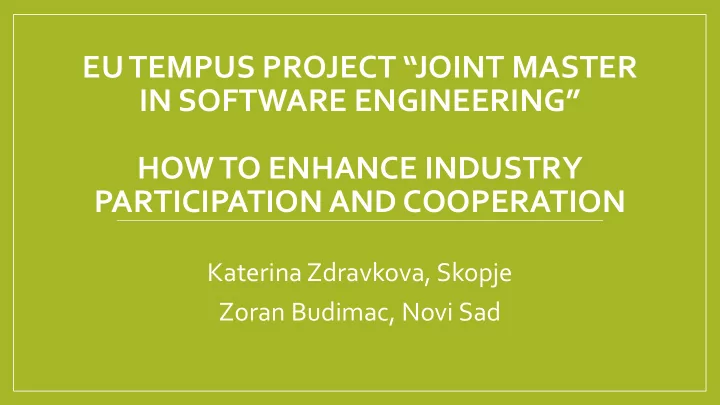

EU TEMPUS PROJECT “JOINT MASTER IN SOFTWARE ENGINEERING” HOW TO ENHANCE INDUSTRY PARTICIPATION AND COOPERATION Katerina Zdravkova, Skopje Zoran Budimac, Novi Sad
Outline of the presentation • Chronological overview • Enhanced experience in software engineering • Industry participation and cooperation in Skopje • Industry participation and cooperation in Novi Sad • New curricula in software engineering in Skopje • Conclusion
Joint course in Software Engineering • Created at Humboldt University in Berlin • Translated from German into English • Available from https://www2.informatik.hu-berlin.de/swt/intkoop/jcse/ • Implemented as a core module at undergraduate studies in Berlin, Novi Sad, Plovdiv and Skopje • Still very attractive and extremely useful • Many joint publications presented its success
Joint M.Sc. curricula in Software Engineering • Created as part of the Tempus project CD-JEP-18035-2003 • Available from https://perun.pmf.uns.ac.rs/msc-se/ • Formally accredited in Serbia in 2005 (autumn) and in Macedonia in 2006 (spring) • Started as part of the Tempus project • Mobility supported by various projects, predominantly by the DAAD project • During Tempus project, mobility of 20 teachers and more than 100 students • Afterwards, mobility was enabled by Mira’s project • For almost a decade, only teachers’ mobility was supported by DAAD
Outcomes of Joint M.Sc. Curriculum (1) • Master students imposed many new techniques to industry: • Agile programming • Efficient requirements engineering • Implementation of patterns during software architecture and design • Novel quality assurance approaches
Outcome of Joint M.Sc. Curriculum (2) • Increased awareness of: • Critical systems • Ethical problems and standardization • Consequently, the products they create are more mature than previously • Without the joint effort of all teachers and consultants at the joint master studies, this process could not be as efficient and effective
Industry participation and cooperation in Skopje
Industry participation and cooperation in Novi Sad •
Industry participation and cooperation • More than 20 former master students in Skopje and in Novi Sad received their PhD degree and contribute to the development of new software engineering courses • IT industry in Macedonia and Serbia offer many new jobs with an income that is significantly higher than in other areas • Most master students from Novi Sad stay in the country and work for offshore foreign software companies • Nevertheless, many students from Skopje continued their career abroad (Germany, Ireland and Netherlands)
New curricula at FINKI • Undergraduate studies in Software Engineering and Information Systems • Prospective new students in 2018/19: • In total, 1100 can enroll FCSE next academic year • 6 directions • 280 new students in the Macedonian classes • 80 new students in the English class • Graduate studies in Software Engineering • In total, 319 students can enroll FCSE next academic year • 12 directions • 50 new students can enroll Software Engineering
Conclusion • Joint master studies exceeded the expectations • They created hundreds of competent scholars and industry specialists in both countries • IT industry improved immensely thank to new SE experts • Teachers became more competent as well • All these facts prove the quality of the joint M.Sc. studies in Software Engineering • We cordially thank all the teachers who contributed to its successful existence
Recommend
More recommend